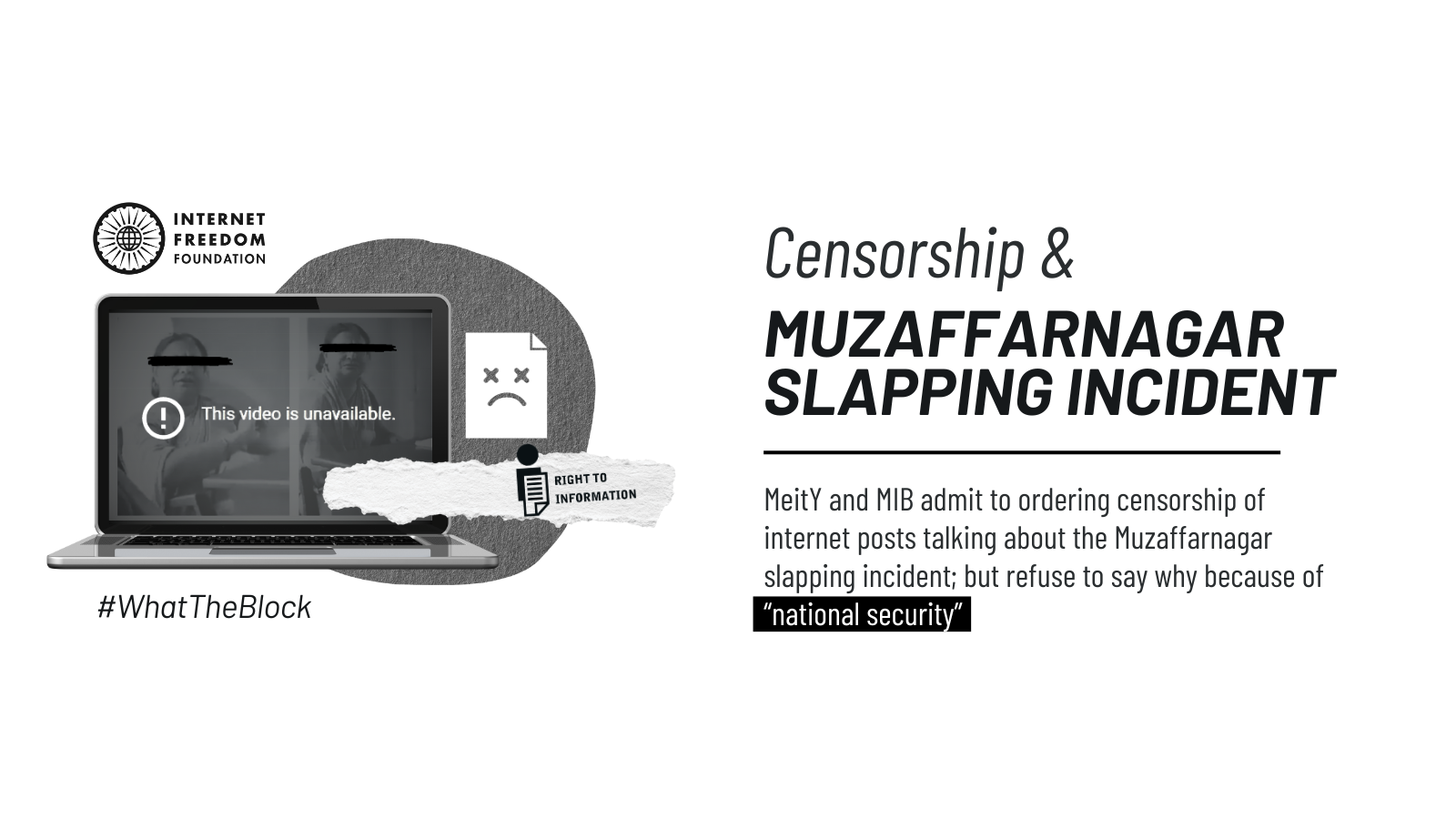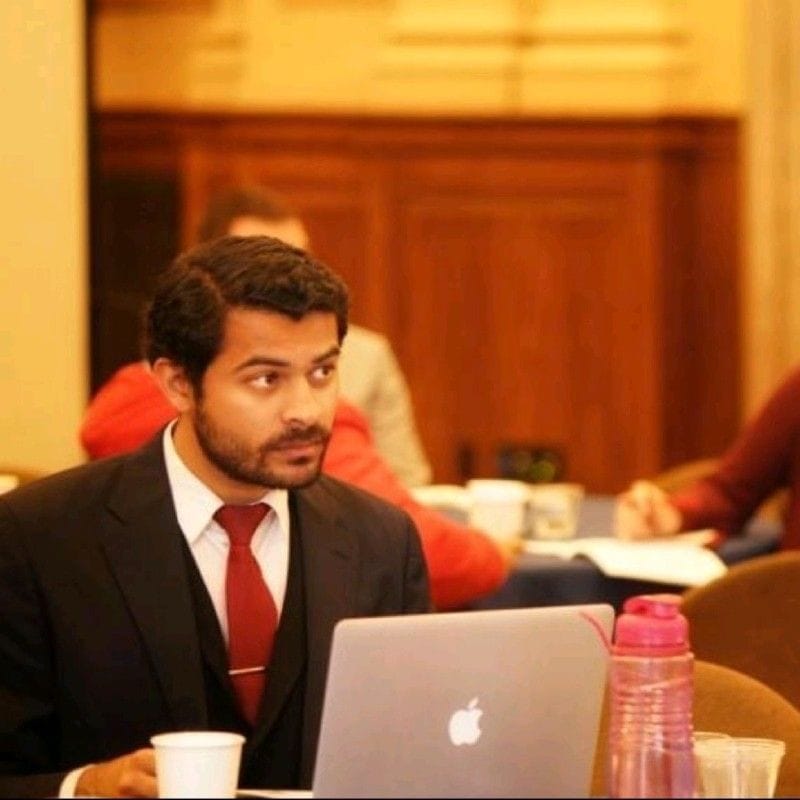
Tl;dr
In August, a video came to light showing a school teacher in Muzaffarnagar, UP, allegedly instructing students to abuse and physically harm a fellow student, purportedly due to his Muslim identity. Soon after, reports emerged that tweets on the incident were being censored. IFF filed RTI requests with the Ministry of Electronics and Information Technology (MeitY) and the Ministry of Information Broadcasting (MIB) to find out more. Both ministries have responded to IFF’s RTI requests, admitting that they ordered the censorship of tweets relating to the information, but have refused to reveal why.
Why should you care?
Censorship in India is currently undertaken in a highly opaque manner. A lack of transparency helps in perpetuating a lack of accountability. IFF seeks transparency from the government in matters of online free expression and censorship.
Censorship by two Ministries
In separate RTI responses, both Ministries have stated that they have ordered censorship. However, they refused to reveal which tweets or twitter accounts or other pieces of online information were censored by them, so it’s not possible to determine whether there are any tweets or accounts in relation to which both Ministries issued concurrent orders. In fact, both Ministries have also refused to reveal why the censorship was undertaken, instead invoking exemptions under 8(1)(a) of the Right to Information Act, 2005, as amended (RTI Act).
MeitY stated that the matter was dealt under the Information Technology (Procedure and Safeguards for Blocking for Access of Information by Public) Rules, 2009 (Blocking Rules, 2009) and S. 69A of the Information Technology Act, 2000 (IT Act). But it also said that as a result of this, the matter is automatically confidential in nature and cannot be disclosed. MeitY did note that under Rule 14 of the Blocking Rules, 2009, the Review Committee shall meet once in two months, but did not provide any indication of when the Committee will meet, or if it has already met to discuss the censorship related to the Muzaffarnagar incident.
Further, MeitY cited Rule 16 of the Blocking Rules, 2009, which states that strict confidentiality shall be maintained regarding all the requests and complaints received and actions taken thereof. MeitY also claimed that S.69A of the IT Act is “related to sovereignty and integrity of India, the security, strategic interests of the State, relation with foreign State or lead to incitement of an offence”. Accordingly, MeitY also claimed an exemption under 8(1)(a) of the RTI Act and rejected the RTI request.

MIB, on the other hand, similarly admitted that it had ordered the censorship under Rule 16 of the Information Technology (Intermediary Guidelines and Digital Media Ethics Code) Rules, 2021 (IT Rules, 2021). It also claimed that S.69A of the IT Act and the 2009 Blocking Rules, 2009 require maintaining confidentiality, and rejected our RTI request under S.8(1)(a) of the RTI Act.

S. 8(1)(a) of the RTI Act allows government ministries and departments to reject RTI applications on grounds such as national security.

What was the Muzaffarnagar slapping incident?
In August 2023, a video showing alleged misconduct by a school teacher in Muzaffarnagar, UP, came to light. This video reportedly shows her instructing students to abuse and physically harm a fellow student, purportedly due to his Muslim identity. The incident rightly sparked outrage, with demands for a thorough investigation and legal action against the teacher. The disturbing nature of the video highlighted the need for a swift and just response from authorities.
Disappointingly, reports emerged parallelly of tweets on the incident being censored, including tweets from journalists. Some of these Twitter accounts reportedly received a notification from Twitter claiming that such censorship action was in response to a legal demand.
IFF released a short statement on the incident noting the incident and the censorship that it saw in response. We raised three main points:
First, there is an alarming trend emerging when news of such incidents break. Instead of addressing the issue at hand, there is a tendency in the Indian government to resort instead to censorship. This raises concerns about the authorities’ priorities and approach to handling such situations. We saw a similar approach when the shameful video from Manipur came to light, depicting an incident of sexual violence against women.
Second, prima facie, the tweets withheld in relation to the Muzaffarnagar incident did not appear to meet the threshold laid out under Section 69A of the IT Act. And third that, withholding such tweets has broader implications for constitutionally-protected free speech rights. The lack of transparency in the process fuels confusion and contributes to an environment of limited accountability and a high degree of opaqueness.
IFF filed an RTI request to find out why
We also filed RTI requests with the MeitY and MIB to find out if the censorship had taken place on their orders, because the opaqueness surrounding government censorship does not even allow us to find out if the censorship was ordered by the Government, and if so, which branch. We also wanted to find out why. In all, the questions we asked MeitY and MIB were the following:
- Please provide information regarding whether any Tweets from any Twitter accounts have been blocked or withheld since 25.08.2023 in relation to the incident. If yes, please provide a copy of the blocking orders that led to it, and the reasons thereof. Please also provide all materials you relied upon while issuing the blocking orders.
- Please provide the list of Tweets from all Twitter accounts that were blocked or withheld 25.08.2023 onwards. Also, please provide the number of Tweets blocked for each such account.
- Please provide information regarding whether a Committee under Rule (16) of the Information Technology (Intermediary Guidelines and Digital Media Ethics Code) Rules, 2021, reviewed the orders blocking Tweets on Twitter. If yes, please provide the minutes of meetings, material relied upon, a copy of findings and decision with file notings. If not, reasons thereof.
While both Ministries confirmed that Tweets were indeed censored on their orders, no other information was provided by them.
We will file first appeals against these orders and continue to fight against arbitrary, opaque and illegal censorship.
Important Documents
- Our RTI request to the Ministry of Electronics & Information Technology (MeitY) dated August 29, 2023 (link)
- Our RTI request to the Ministry of Information & Broadcasting (MIB) dated August 29, 2023 (link)
- MeitY’s RTI response dated September 27, 2023 (link)MIB’s RTI response dated September 29, 2023 (link)

